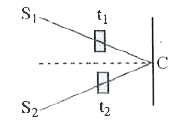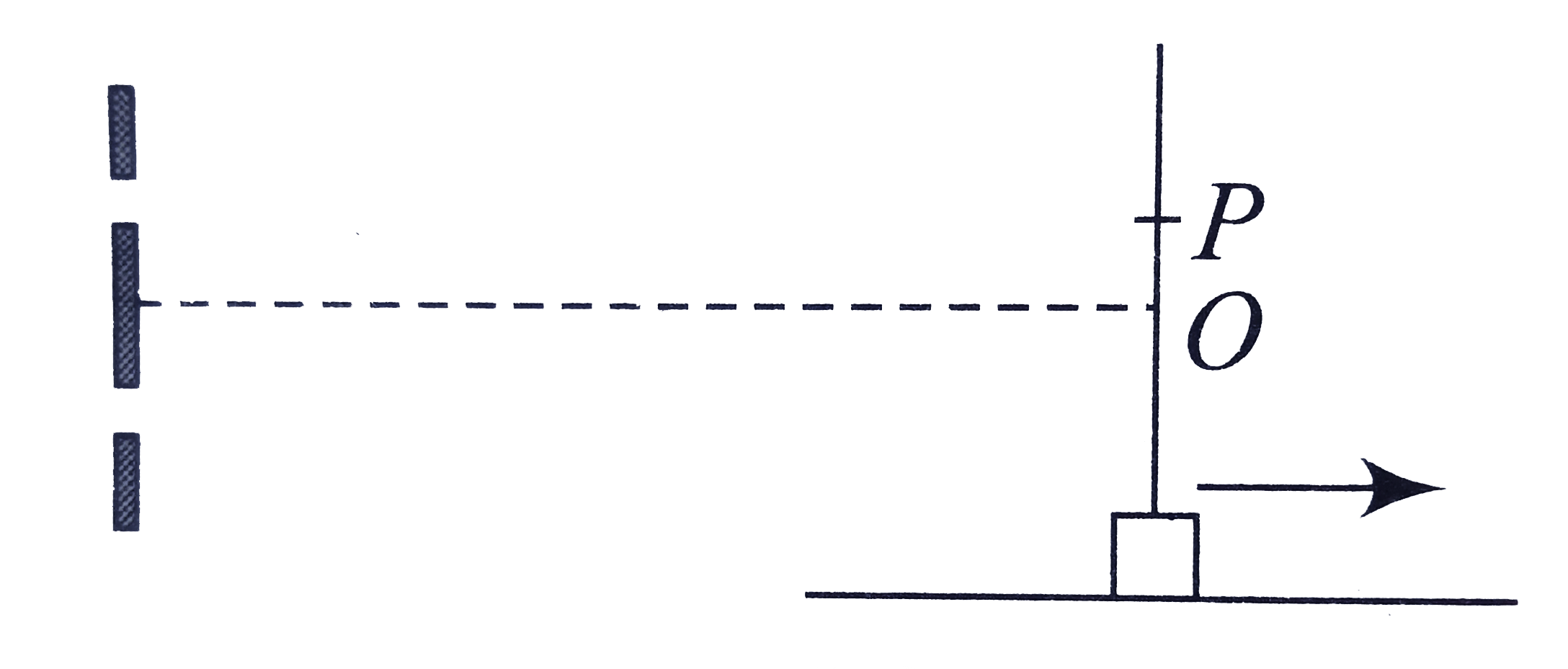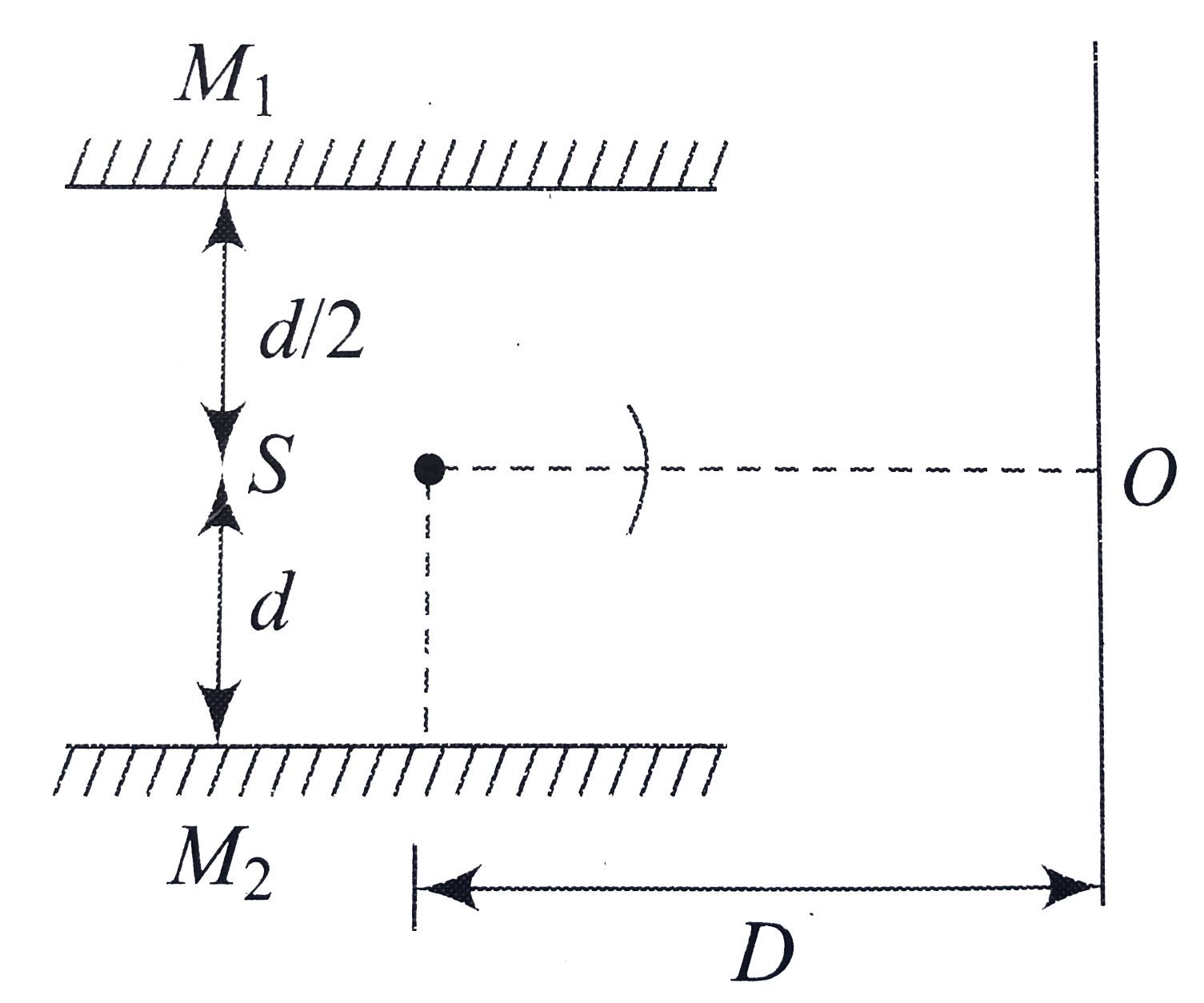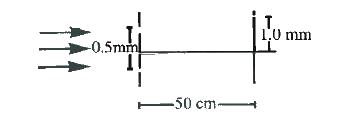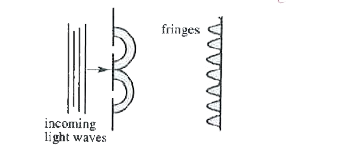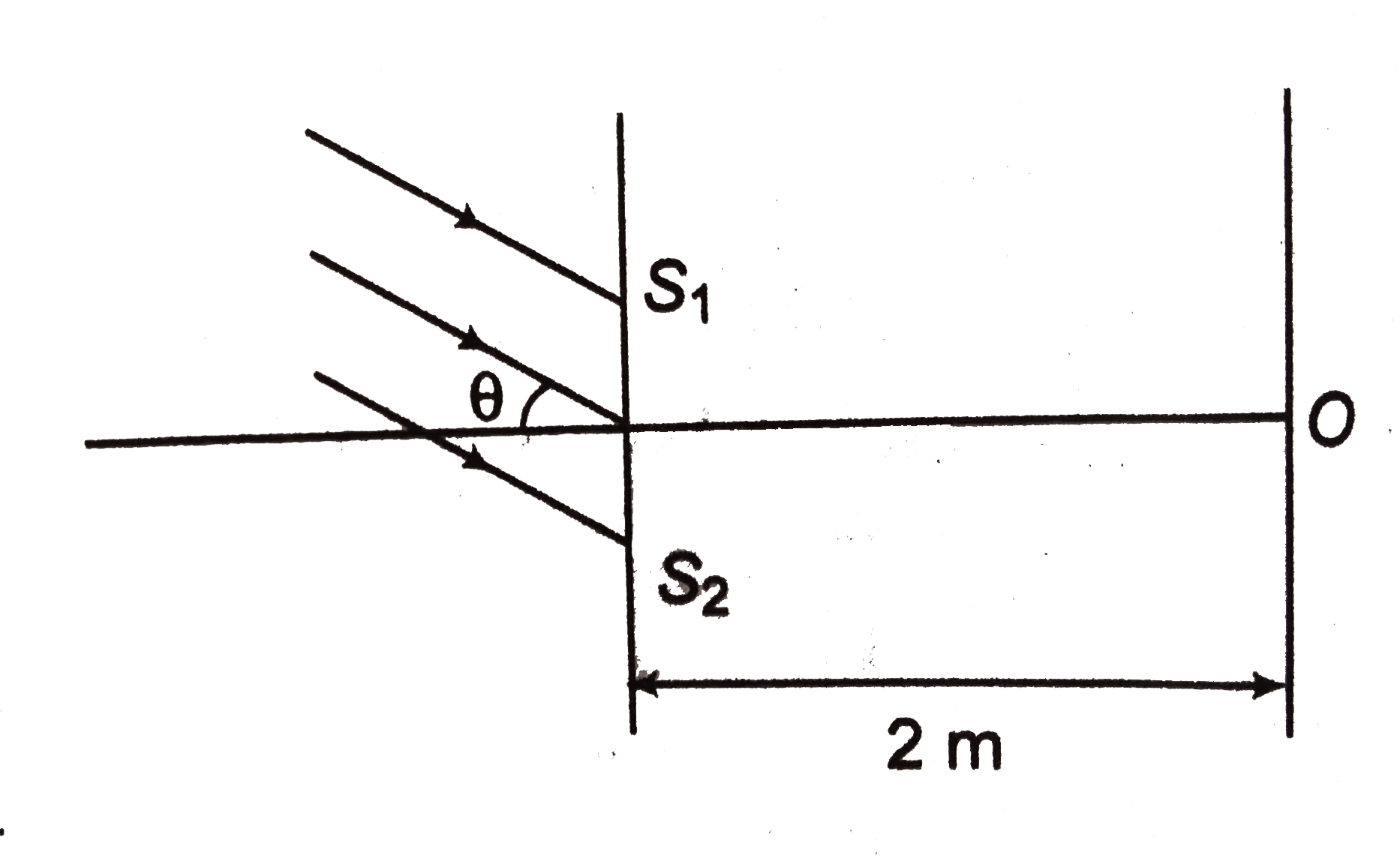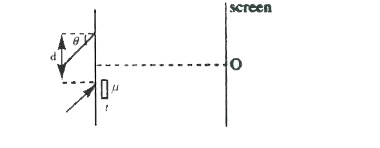LECTURE SHEET EXERCISE-I (LEVEL -II) (ADVANCED ) Matrix Matching Type Questions from AAKASH SERIES WAVE OPTICS for Class 12
| Class 12 | PHYSICS |
| Chapter | WAVE OPTICS |
| AAKASH SERIES | LECTURE SHEET EXERCISE-I (LEVEL -II) (ADVANCED ) Matrix Matching Type Questions |
| Medium | English |
| Academic Year | 2023-2024 |
Question 9
The distance between the tew slits in a Young's double slit experiment is d and the distance of the screen from the plane of the slits is b, P is a point on the screen directly infront of one of the slits. The path difference between the waves arriving at P from the two slits is View SolutionQuestion 13
In a Young's double slit experiment using monochromatic light, the fringe pattern shifts by a certain distance on the screen when a mica sheet of refractive index 1.6 and thickness 1.964 microns is introduced in the path of one of the interfering waves. The mica sheet is then removed and the distance between the slits and screen is doubled. It is found that the distance between successive maxima now is the same as observed fringe shift upon the introduced of the mica sheet . Calculate the wavelength of the monochromatic light used in the experiment .View SolutionQuestion 16
A transparent glass plate of thickness 0.5 mm and refractive index 1.5 is placed infront of one of the slits in a double slit experiment. If the wavelength of light used is 6000A∘, the ratio of maximum to minimum intensity in the interference pattern is 25/4. Then the ratio of light intensity transmitted to incident on thin transparent glass plate is View SolutionQuestion 17
White light is passed through a double slit and interference pattern is observed on a screen 2.5 m away. The separation between the slits is 0.5 mm. The first violet and red fringes are formed 2.0 mm and 3.5 mm away from the central white fringe. Calculate the wavelengths of the violet and the red light.View SolutionQuestion 18
A source emitting light of wavelengths 480 nm and 600 nm is used in a double slit interference experiment. The separation between the slits is 0.25 mm and the interference is observed on a screen placed at 150 cm from the slits. Find the linear separation between the first maximum (next to the central maximum) corresponding to the two wavelengths. View SolutionQuestion 19
A parallel beam of monochromatic light is used in a Young's double slit experiment. The slits are separated by a distance d and the screen is placed parallel to the plane of the slits. Show that if the incident beam makes an angle θ=sin−1(λ2d) with the normal to the plane of the slits, there will be a dark fringe at the centre Po of the pattern. View SolutionQuestion 21
In Young's double slit experiment, the two slits acts as coherent sources of equal amplitude A and wavelength λ. In another experiment with the same set up the two slits are sources of equal amplitude A and wavelength λ but are indoherent. The ratio of the intensity of light at the mid point of the screen in the first case to that in the second case isView SolutionQuestion 25
In an interference arrangement similar to Young's double-slit experiment, the slits S1 and S2 are illuminated with coherent microwave sources, each of frequency 106 Hz. The sources are synchronized to have zero phase difference. The slits are separated by a distance d=150.0m. The intensity I(θ) is measured as a function of θ, where θ is defined asa shown in fig. If I0 is hte maximum intensity, then I(θ) for 0≤θ≤90∘ is given by ltbrrgt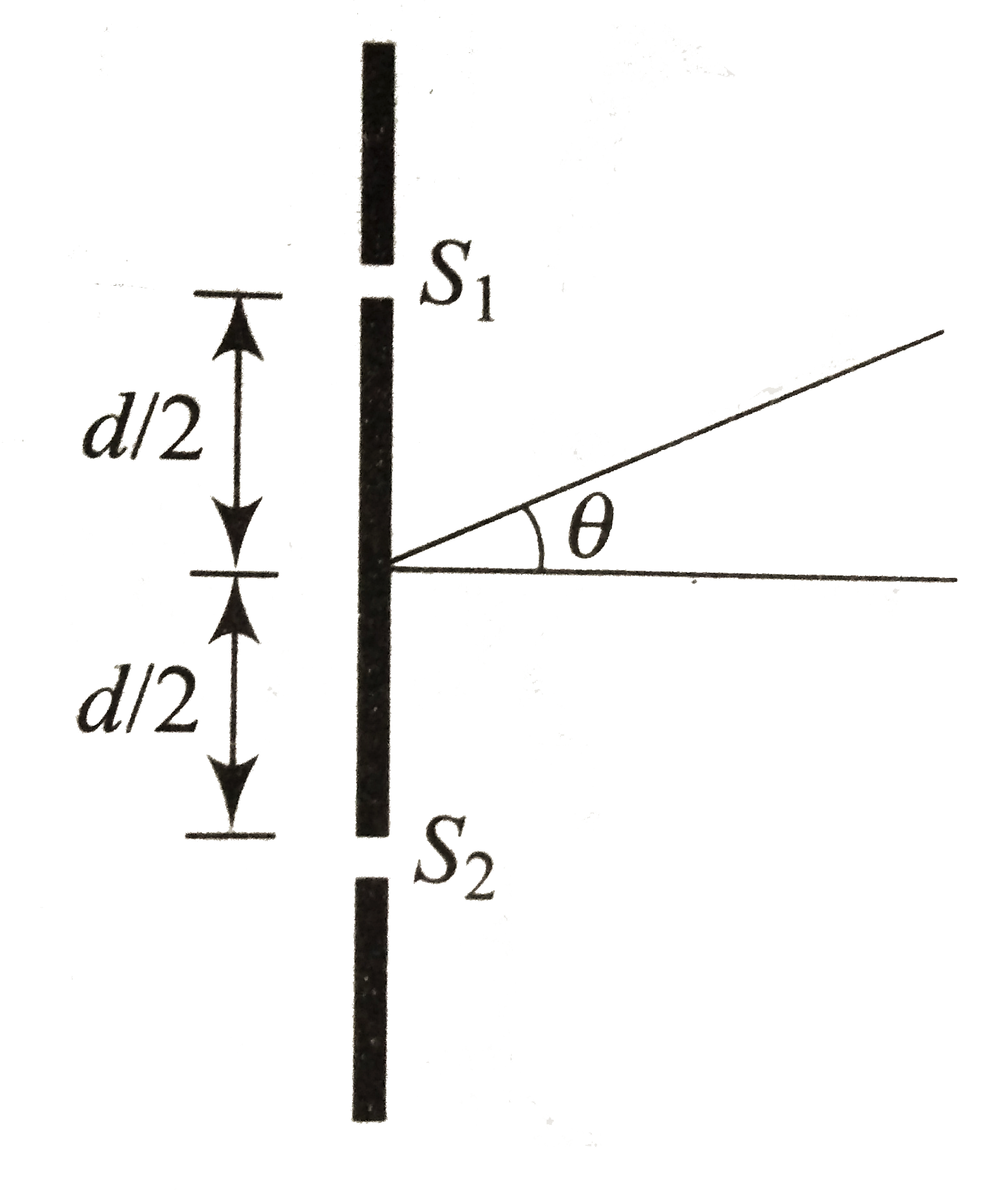 View Solution
View SolutionQuestion 28
White coheral light (400 nm 700 nm ) is sent through the slit of a Young.s double slit experiment. The separation between the slits is 0.5 mm and the screen is 50 away from the slits . There is a hole in the screen at a point 1.0 mm away (along the width of the fringes) from the central line. Which wavelengths (s) will be absent in the light coming from the hole ?
 View Solution
View SolutionQuestion 30
Consider the arrangement shown in figure. By some mechanism,
the separation between the slits S3andS4 can be changed. The intensity is
measured at the point P which is at the common perpendicular bisector of S1S2
and S3S4. When z=Dλ2d, the intensity measured at P is I. Find the intensity when
z is equal to
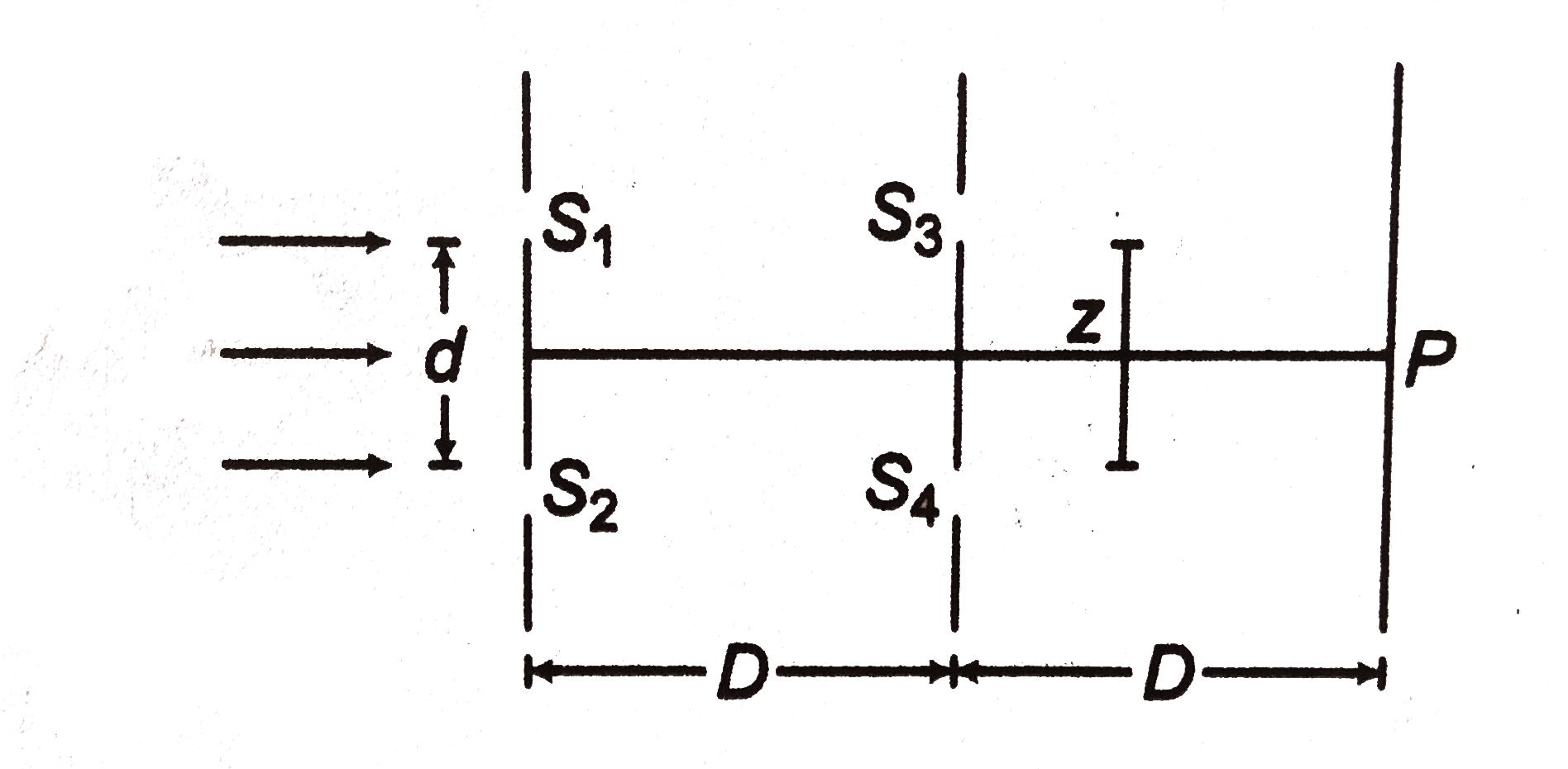
(a)Dλd(b)3Dλ2d(c)2Dλd .View SolutionQuestion 31
Plane microwaves from a transmitter are directed normally towards a plane reflector. A detector moves along the normal to the reflection. Between positions of 14 successive maxima, the detector travels a distance 0.14m. If the velocity of light is 3×108m/s, find the frequency of the transmitter.View SolutionQuestion 32
Consider the situation shown in figure. The two slits S1andS2 placed symmetrically around the central line are illuminated by a monochromatic light of wavelength λ. The separation between the slits is d. The light transmitted by the slits falls on a screen Σ1 placed at a distance D from the slits. The slit S3 is at the placed central line and the slit S4, is at a distance z from S3. Another screenΣ2 is placed a further distance D away from 1,1. Find the ratio of the maximum to minimum intensity observed on Σ2 if z is equal to a. z=λD2d b. λDd c. λD4d
 View Solution
View SolutionQuestion 34
A plate of thickness t made of a material of refractive index μ is placed in front of one of the slits in a double slit experiment. (a) Find the changes in the optical path due to introduction of the plate. (b) What should be the minimum thickness t which will make the intensity at the center of the fringe pattern zero ? Wavelength of the light used is λ. Neglect any absorption of light in the plate.View SolutionQuestion 35
A mica strip and a polysterence strip are fitted on the two slite of a double slit apparatus. The thickness of the strips is 0.50 mm and the separation between the slits is 0.12 cm. The refractive index of mica and polysterene are 1.58 and 1.55 respectively for the light of wavelength 590 nm which is used in the experiment. The interference is observed on a screen a distance one meter away. (a) What would be the fringe- width ? (b) At what distance from the centre will the first maximum be located ?View SolutionQuestion 36
A mica strip and a polysterence strip are fitted on the two slite of a double slit apparatus. The thickness of the strips is 0.50 mm and the separation between the slits is 0.12 cm. The refractive index of mica and polysterene are 1.58 and 1.55 respectively for the light of wavelength 590 nm which is used in the experiment. The interference is observed on a screen a distance one meter away. (a) What would be the fringe- width ? (b) At what distance from the centre will the first maximum be located ?View SolutionQuestion 37
YDSE is carried out in a liquid of refractive index μ=1.3 and a thin film of air is formed in front of the lower slit as shown in the figure. If a maxima of third order is formed at the origin O, find the thickness of the air film. Find the positions of the fourth maxima. The wavelength of light is air is λ0=0.78μm and D/d=1000. (##DCP_V05_C32_E01_086_Q01.png" width="80%">View SolutionQuestion 39
In a YDSE experiment if a slab whose refractive index can be varied is placed in front of one of the slits, then the variation of resultant intensity at mid-point of screen with μ will be best represented by (μ≥1). [Assume slits of equal width and there is no absorption by slab ] View SolutionQuestion 41
Two coherent narrow slits emitting light of wavelength λ in the same phase are placed parallel to each other at a small separation of 2λ. The light is collected on a screen S which is placed at a distance D(>>λ) from the slit S1 as shown in figure. Find the finite distance x such that the intensity at P is equal to intensity O.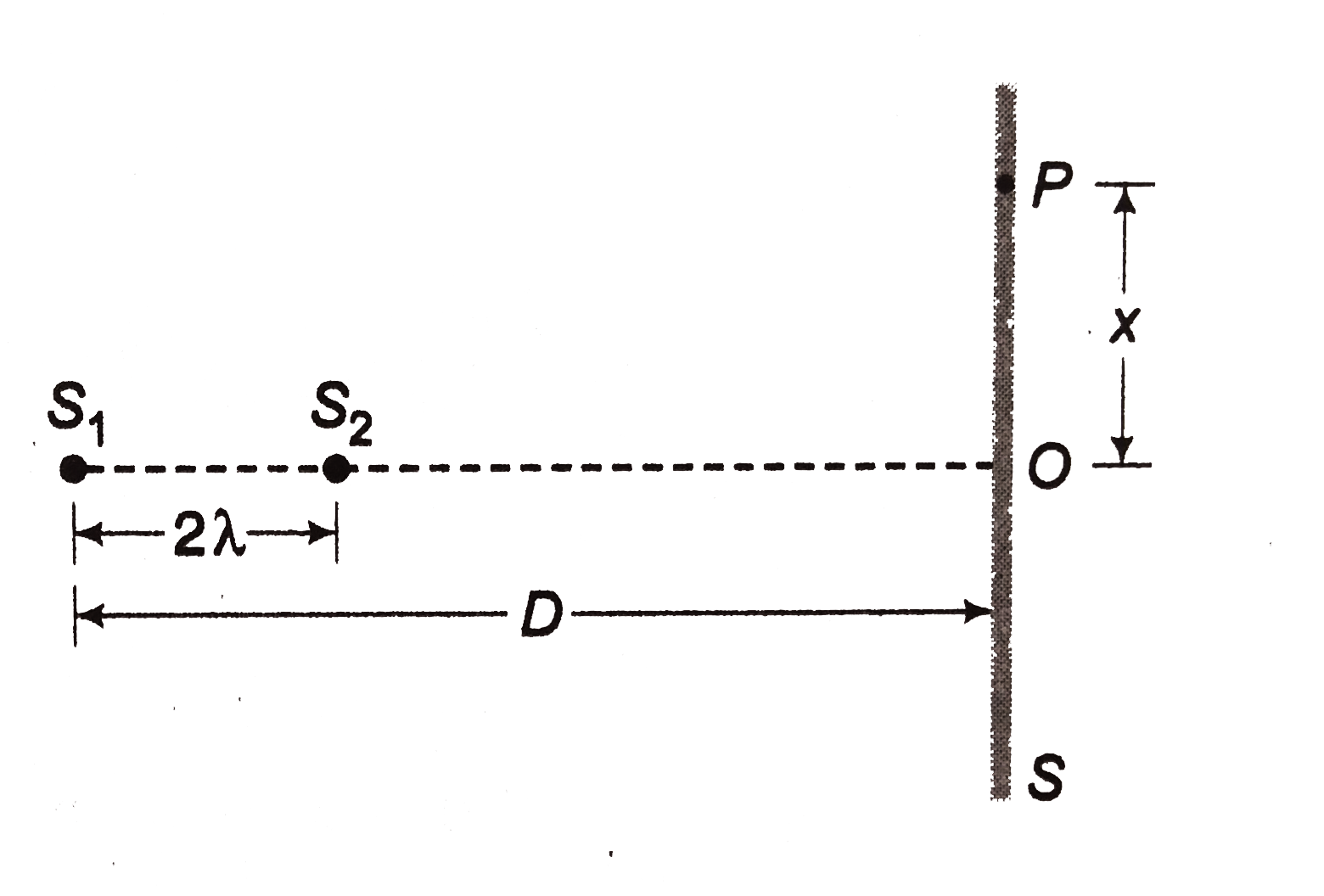 .View Solution
.View SolutionQuestion 45
A vessel ABCD of 10 cm width has two small slits S1 and S2 sealed with identical glass plates of equal thickness. The distance between the slits is 0.8 mm. POQ is the line peropendicular to the plane AB and passing through O, the middle point of S1 and S2. A monochromatic light source is kept at S, 40 cm below P and 2 m form the vessel to illuminate the slits as shown in figure .Calculate the position of the central bright fringe on the other wall CD with respect to line OQ. Now , a liquid is poured into the vessel and filled up to OQ. The central bright fringe is found to be at Q. Calculate the refractive index of the liquid to the liquid.
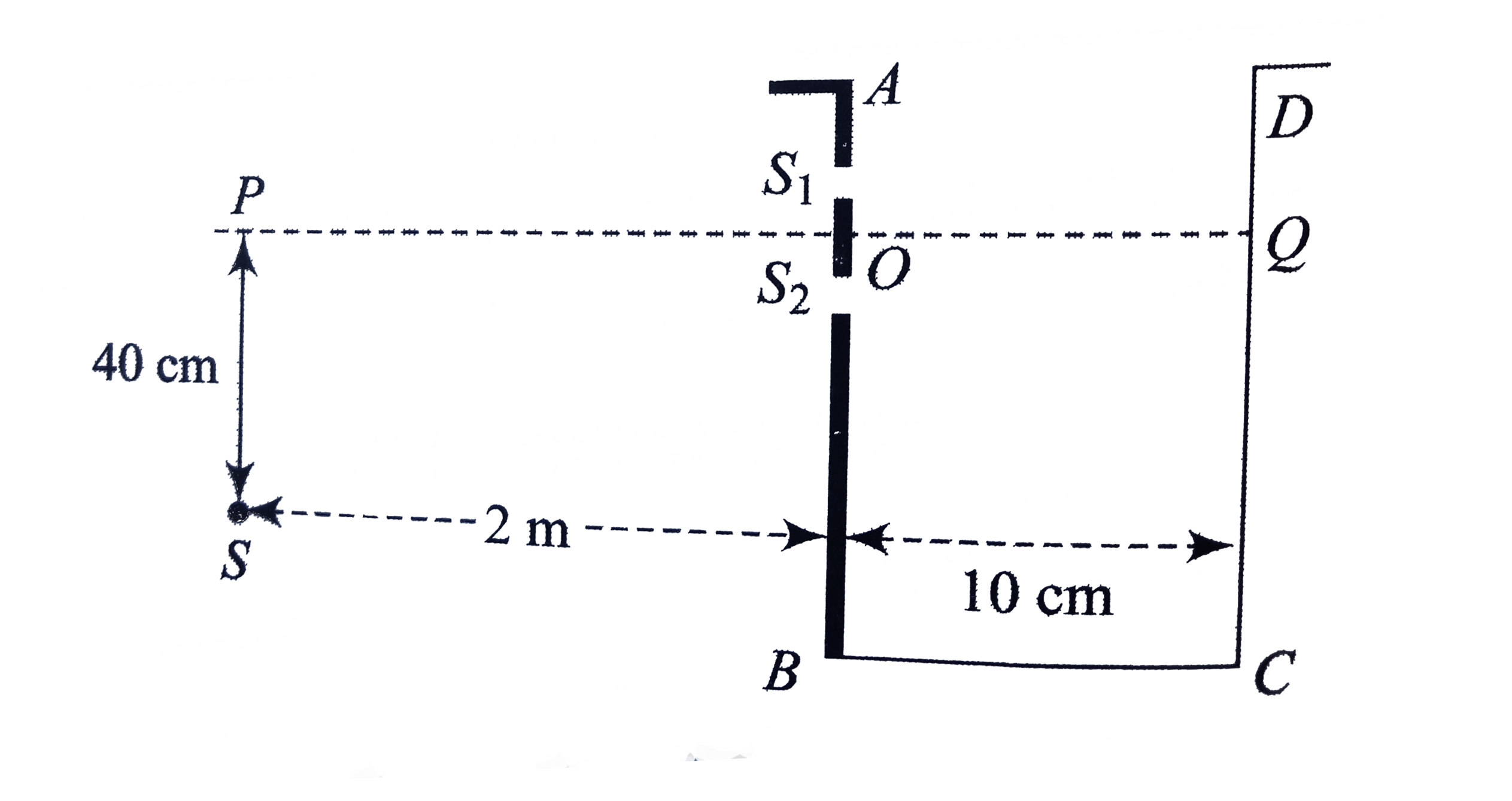 View Solution
View SolutionQuestion 47
In young's double-slit experiment set up, sources S of wavelength 50 nm illumiantes two slits S1 and S2 which act as two coherent sources. The sources S oscillates about its own position according to the equation y=0.5sinπt, where y is in nm and t in seconds. The minimum value of time t for which the intensity at point P on the screen exaclty in front of the upper slit becomes minimum is
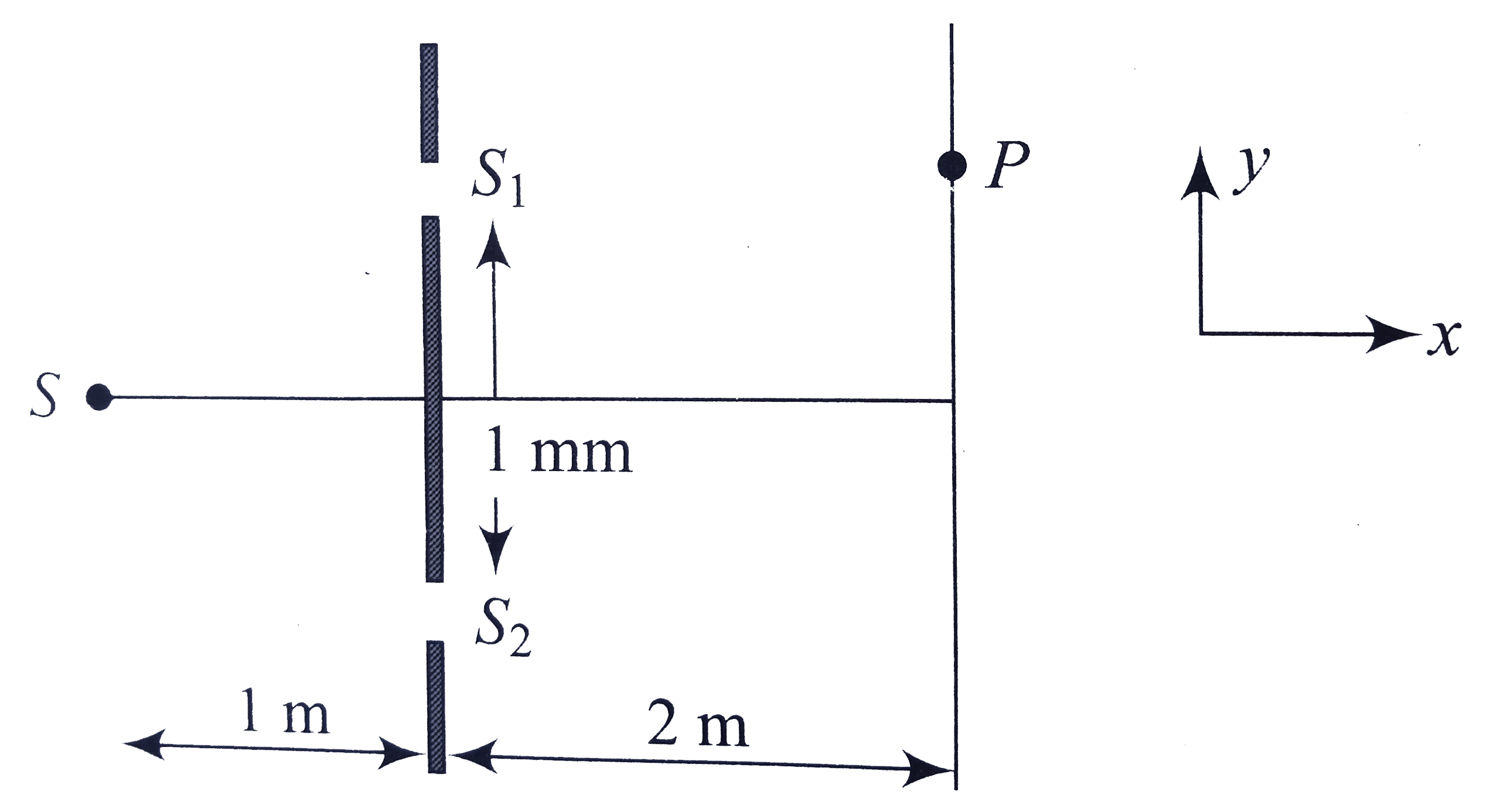 View Solution
View SolutionQuestion 49
White light is used to illuminate the two slits in a Young's double slit experiment. The separation between the slits is b and the screen is at a distance d(>>b) from the slits At a point on the screen directly in front of one of the slits, certain wavelengths are missing some of these missing wavelengths are View SolutionQuestion 52
Light of wavelengthλ=500nm falls on two narrow slits placed a distance d = 50×10−4 cm
apart, at an angle ϕ=30∘ relative to the slits as shown in figure. On the lower slit a transparent slab of thickness 0.1 mm and refractive index 32 is placed. The interference pattern is observed at a distance D=2m from the slits. Then, calculate
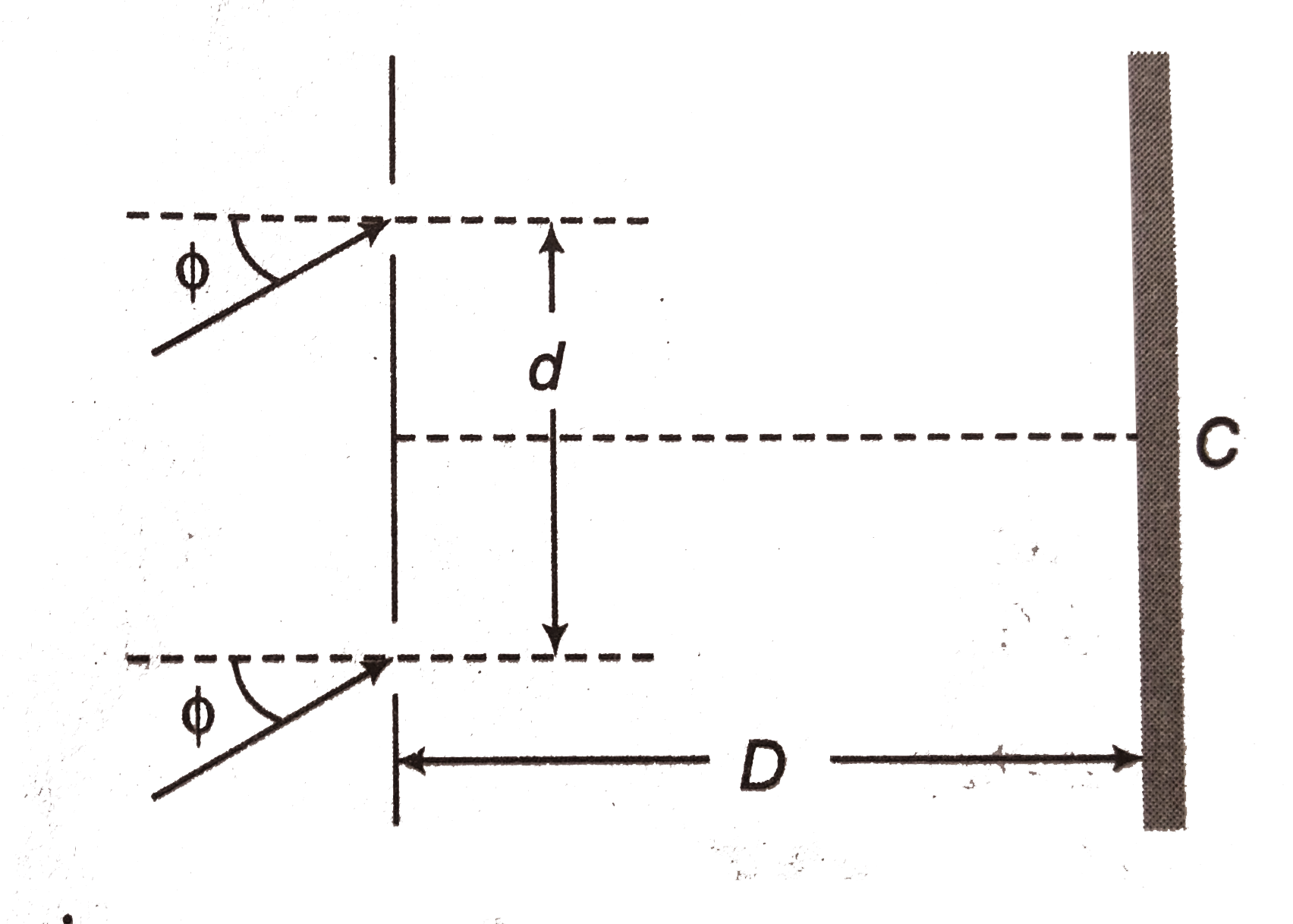
(a) position of the central maxima.
(b) the order of maxima at point C of screen .
(c)how many fringes will pass C, if we remove the transparent slab from the lower slit?View SolutionQuestion 53
Light of wavelengthλ=500nm falls on two narrow slits placed a distance d = 50×10−4 cm
apart, at an angle ϕ=30∘ relative to the slits as shown in figure. On the lower slit a transparent slab of thickness 0.1 mm and refractive index 32 is placed. The interference pattern is observed at a distance D=2m from the slits. Then, calculate

(a) position of the central maxima.
(b) the order of maxima at point C of screen .
(c)how many fringes will pass C, if we remove the transparent slab from the lower slit?View SolutionQuestion 54
Light of wavelengthλ=500nm falls on two narrow slits placed a distance d = 50×10−4 cm
apart, at an angle ϕ=30∘ relative to the slits as shown in figure. On the lower slit a transparent slab of thickness 0.1 mm and refractive index 32 is placed. The interference pattern is observed at a distance D=2m from the slits. Then, calculate

(a) position of the central maxima.
(b) the order of maxima at point C of screen .
(c)how many fringes will pass C, if we remove the transparent slab from the lower slit?View SolutionQuestion 55
In a young's doule slits experiment, a monochromatic source of wavelength λ is used to illuminate the two slits
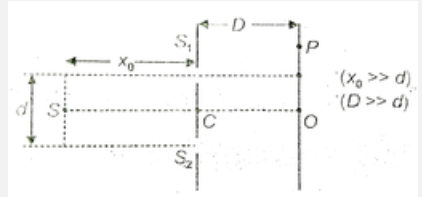
S1 and S2. The slitss S1 and S2 are identical and source S is placed symmetrically as shown. interference pattern is observed on a screen at a distance D from the centre of slit. The distance between the slits is d.
If the resultant intensity at P is same as that O, then the distance OP can not be View SolutionQuestion 56
In a young's doule slits experiment, a monochromatic source of wavelength λ is used to illuminate the two slits
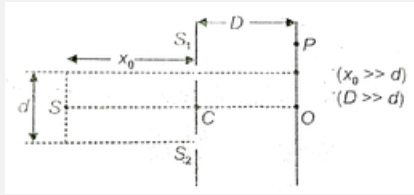
S1 and S2. The slitss S1 and S2 are identical and source S is placed symmetrically as shown. interference pattern is observed on a screen at a distance D from the centre of slit. The distance between the slits is d.
If the source is moved up by a very small distance y0, the central maxima will shift View SolutionQuestion 57
In a young's doule slits experiment, a monochromatic source of wavelength λ is used to illuminate the two slits

S1 and S2. The slitss S1 and S2 are identical and source S is placed symmetrically as shown. interference pattern is observed on a screen at a distance D from the centre of slit. The distance between the slits is d.
If the size of slits S1 is slightly decreased, then View SolutionQuestion 58
A double slit interference pattern is produced on a screen, as shown in the figure, using momochromatic light of wavelength 500 nm. Point P is the location of the central bright fringe, that is produced when light waves arrive in phase without any path difference. A choice of the three strips A, B and C of transparent materials with different thickness and refractive indices is available, as shown in the table. These are placed over one or both of the slits, singularly or in conjunction causing the interference pattern to be shifted across the screen from the original pattern. In the Column - I, how the strips have been placed, is mentioned whereas in the Column-II, order of the fringe at point P on the screen that will be produced due to the placement of the strip(s), is shown. Correctly match both the column.
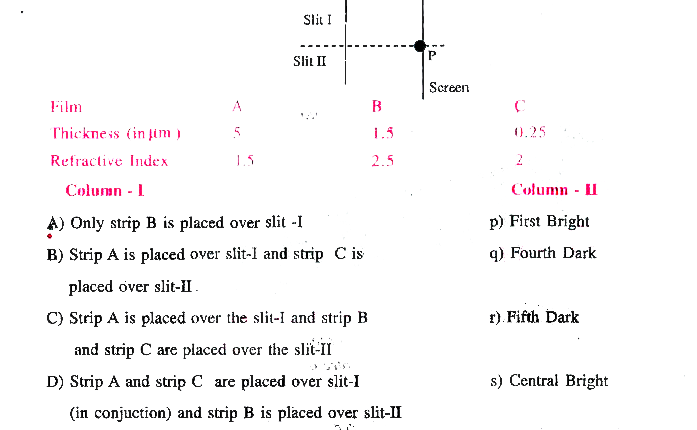 View Solution
View SolutionQuestion 59
In the arrangement shown in figure, z1 and z2 are two screens. Line PO is the bisector line of s1s2 and s3s4,s1 is removed, resultant intensity at O due to slits s1 and s2 is l. now z1 is placed. For different values of y given in column-I match the resultant intensity at O given in column -II.
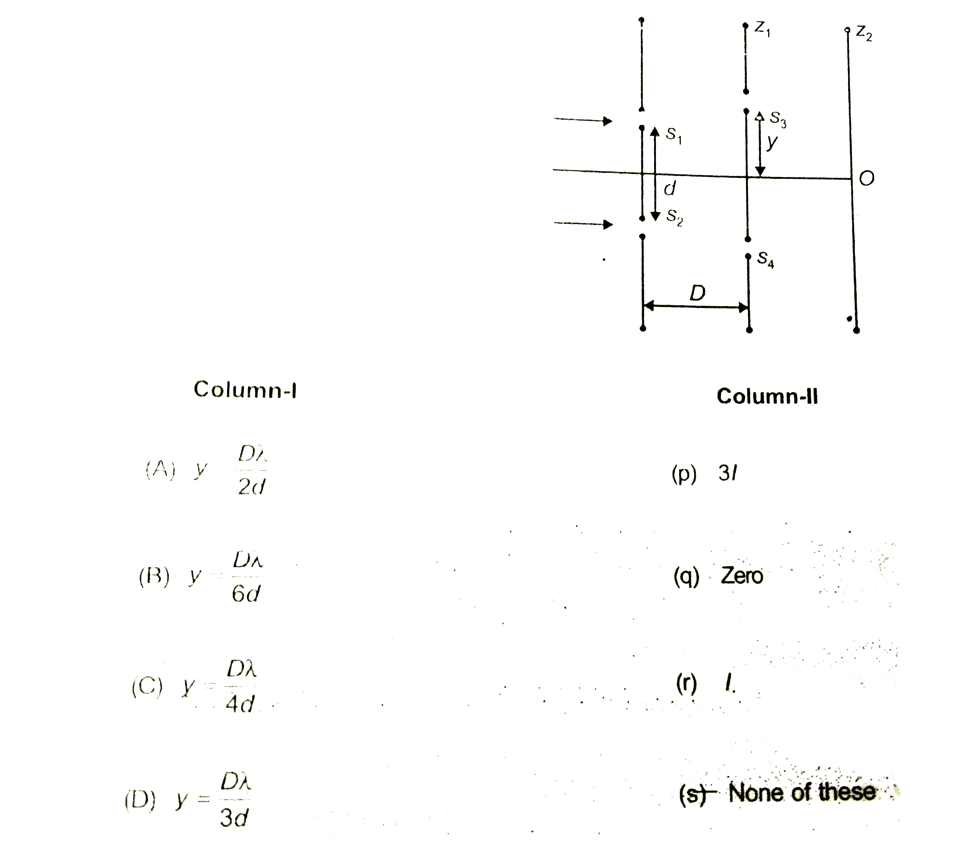 View Solution
View SolutionQuestion 85
(a) Show using a proper diagram how unpolarised light can be linearly polarised by reflection from a transparent glass surface.
(b) The figure shows a ray of light falling normally on. the face AB of an equilateral glass prism having refractive index 3/2, placed A in water of refractive index 4/3. Will this ray suffer total internal reflection on striking the face AC? Justify your answer. View SolutionQuestion 86
Consider the following statement A and B and identify the correct answer
A) The refractive index of the extra-ordinary ray depends on the angle of incidence in double refraction
B) The vibrations of light waves acquire one sidedness fro both ordinary and extraordinary rays in double refractionView SolutionQuestion 87
Arrange the intensities of the transmitted light in their increasing order of magnitudes when they are passed through a system of two polarisers
(A) When incident light is unpolarised and of intensity I and the angle between the polarisers is 30∘
(B) When incident light is polarised of intensity 2I and the angle between the polarisers is 45∘
(C ) When polarised light of intensity 4I is incident and the angle between the polarisers is 90∘
(D) When incident light is unpolarised and of intensity 3I and the angle between the polarisers is 30∘ View SolutionQuestion 91
A beam of unpolarised light is incident on a tourmaline crystal C1. The intensity of the emergent light is I0 and it is incident on another tourmaline crystal C2. It is found that no light emerges from C2. If now C1 is rotated through 45∘ towards C2, the intensity of the light emerging from C2 is View Solution
All Exercises from AAKASH SERIES Class 12 PHYSICS WAVE OPTICS
- EXERCISE (LONG ANSWER QUESTIONS (DIFFRACTION))
- EXERCISE (LONG ANSWER QUESTIONS (INTERFERENCE))
- EXERCISE (LONG ANSWER QUESTIONS (POLARIZATION))
- EXERCISE (SHORT ANSWER QUESTIONS (DIFFRACTION))
- EXERCISE (SHORT ANSWER QUESTIONS (INTERFERENCE))
- EXERCISE (SHORT ANSWER QUESTIONS (POLARIZATION))
- EXERCISE (VERY SHORT ANSWER QUESTIONS (DIFFRACTION))
- EXERCISE (VERY SHORT ANSWER QUESTIONS (INTERFERENCE))
- EXERCISE (VERY SHORT ANSWER QUESTIONS (POLARIZATION))
- LECTURE SHEET (EXERCISE - I) (INTERFERENCE & YDSE) LEVEL - I (MAIN) STRAIGHT OBJECTIVE TYPE QUESTIONS
- LECTURE SHEET (EXERCISE - I) (INTERFERENCE & YDSE) LEVEL - II (ADVANCED) LINKED COMPREHENSION TYPE QUESTIONS
- LECTURE SHEET (EXERCISE - I) (INTERFERENCE & YDSE) LEVEL - II (ADVANCED) MATRIX MATCH TYPE QUESTIONS
- LECTURE SHEET (EXERCISE - I) (INTERFERENCE & YDSE) LEVEL - II (ADVANCED) MORE THAN ONE CORRECT ANSWER TYPE QUESTIONS
- LECTURE SHEET (EXERCISE - I) (INTERFERENCE & YDSE) LEVEL - II (ADVANCED) (STRAIGHT OBJECTIVE TYPE QUESTIONS)
- LECTURE SHEET (EXERCISE - I) (INTERFERENCE & YDSE) LEVEL - II (ADVANCED) LEVEL - II (STRAIGHT OBJECTIVE TYPE QUESTIONS) INTEGER TYPE QUESTIONS
- LECTURE SHEET EXERCISE - II DIFFRACTION (LEVEL - I (MAIN) (STRAIGHT OBJECTIVE TYPE QUESTIONS)
- LECTURE SHEET EXERCISE - II DIFFRACTION (LEVEL - I (MAIN) LEVEL - II (STRAIGHT OBJECTIVE TYPE QUESTIONS)
- LECTURE SHEET EXERCISE - III POLARLISATION (LEVEL-II (STRAIGHT OBJECTIVE TYPE QUESTIONS))
- LECTURE SHEET EXERCISE - III POLARLISATION(LEVEL - I (MAIN) (STRAIGHT OBJECTIVE TYPE QUESTIONS))
- LECTURE SHEET EXERCISE-I (LEVEL -I) (MAIN) STRAIGHT OBJECTIVE TYPE QUESTIONS
- LECTURE SHEET EXERCISE-I (LEVEL -II) (ADVANCED ) INTERGER TYPE QUESTIONS
- LECTURE SHEET EXERCISE-I (LEVEL -II) (ADVANCED ) LINKED COMPREHENSION TYPE QUESTIONS
- LECTURE SHEET EXERCISE-I (LEVEL -II) (ADVANCED ) MATRIX MATCHING TYPE QUESTIONS
- LECTURE SHEET EXERCISE-I (LEVEL -II) (ADVANCED ) MORE THAN ONE CORRECT ANSWER TYPE QUESTIONS
- LECTURE SHEET EXERCISE-I (LEVEL -II) (ADVANCED )STARIGHT OBJECTIVE TYPE QUESTIONS
- LECTURE SHEET EXERCISE-II (LEVEL -I) (MAIN) (STRAIGHT OBJECTIVE TYPE QUESTIONS)
- LECTURE SHEET EXERCISE-II (LEVEL -II) (MAIN) (STRAIGHT OBJECTIVE TYPE QUESTIONS)
- LECTURE SHEET EXERCISE-III (LEVEL -I) (MAIN) (STRAIGHT OBJECTIVE TYPE QUESTIONS)
- LECTURE SHEET EXERCISE-III (LEVEL -II) (MAIN) (STRAIGHT OBJECTIVE TYPE QUESTIONS)
- EXERCISE (LONG ANSWER QUESTIONS (DIFFRACTION))
- EXERCISE (LONG ANSWER QUESTIONS (INTERFERENCE))
- EXERCISE (LONG ANSWER QUESTIONS (POLARIZATION))
- EXERCISE (SHORT ANSWER QUESTIONS (DIFFRACTION))
- EXERCISE (SHORT ANSWER QUESTIONS (INTERFERENCE))
- EXERCISE (SHORT ANSWER QUESTIONS (POLARIZATION))
- EXERCISE (VERY SHORT ANSWER QUESTIONS (DIFFRACTION))
- EXERCISE (VERY SHORT ANSWER QUESTIONS (INTERFERENCE))
- EXERCISE (VERY SHORT ANSWER QUESTIONS (POLARIZATION))
- LECTURE SHEET (EXERCISE - I) (INTERFERENCE & YDSE) LEVEL - I (MAIN) STRAIGHT OBJECTIVE TYPE QUESTIONS
- LECTURE SHEET (EXERCISE - I) (INTERFERENCE & YDSE) LEVEL - II (ADVANCED) LINKED COMPREHENSION TYPE QUESTIONS
- LECTURE SHEET (EXERCISE - I) (INTERFERENCE & YDSE) LEVEL - II (ADVANCED) MATRIX MATCH TYPE QUESTIONS
- LECTURE SHEET (EXERCISE - I) (INTERFERENCE & YDSE) LEVEL - II (ADVANCED) MORE THAN ONE CORRECT ANSWER TYPE QUESTIONS
- LECTURE SHEET (EXERCISE - I) (INTERFERENCE & YDSE) LEVEL - II (ADVANCED) (STRAIGHT OBJECTIVE TYPE QUESTIONS)
- LECTURE SHEET (EXERCISE - I) (INTERFERENCE & YDSE) LEVEL - II (ADVANCED) LEVEL - II (STRAIGHT OBJECTIVE TYPE QUESTIONS) INTEGER TYPE QUESTIONS
- LECTURE SHEET EXERCISE - II DIFFRACTION (LEVEL - I (MAIN) (STRAIGHT OBJECTIVE TYPE QUESTIONS)
- LECTURE SHEET EXERCISE - II DIFFRACTION (LEVEL - I (MAIN) LEVEL - II (STRAIGHT OBJECTIVE TYPE QUESTIONS)
- LECTURE SHEET EXERCISE - III POLARLISATION (LEVEL-II (STRAIGHT OBJECTIVE TYPE QUESTIONS))
- LECTURE SHEET EXERCISE - III POLARLISATION(LEVEL - I (MAIN) (STRAIGHT OBJECTIVE TYPE QUESTIONS))
- LECTURE SHEET EXERCISE-I (LEVEL -I) (MAIN) STRAIGHT OBJECTIVE TYPE QUESTIONS
- LECTURE SHEET EXERCISE-I (LEVEL -II) (ADVANCED ) INTERGER TYPE QUESTIONS
- LECTURE SHEET EXERCISE-I (LEVEL -II) (ADVANCED ) LINKED COMPREHENSION TYPE QUESTIONS
- LECTURE SHEET EXERCISE-I (LEVEL -II) (ADVANCED ) MATRIX MATCHING TYPE QUESTIONS
- LECTURE SHEET EXERCISE-I (LEVEL -II) (ADVANCED ) MORE THAN ONE CORRECT ANSWER TYPE QUESTIONS
- LECTURE SHEET EXERCISE-I (LEVEL -II) (ADVANCED )STARIGHT OBJECTIVE TYPE QUESTIONS
- LECTURE SHEET EXERCISE-II (LEVEL -I) (MAIN) (STRAIGHT OBJECTIVE TYPE QUESTIONS)
- LECTURE SHEET EXERCISE-II (LEVEL -II) (MAIN) (STRAIGHT OBJECTIVE TYPE QUESTIONS)
- LECTURE SHEET EXERCISE-III (LEVEL -I) (MAIN) (STRAIGHT OBJECTIVE TYPE QUESTIONS)
- LECTURE SHEET EXERCISE-III (LEVEL -II) (MAIN) (STRAIGHT OBJECTIVE TYPE QUESTIONS)
- EXERCISE (LONG ANSWER QUESTIONS (DIFFRACTION))
- EXERCISE (LONG ANSWER QUESTIONS (INTERFERENCE))
- EXERCISE (LONG ANSWER QUESTIONS (POLARIZATION))
- EXERCISE (SHORT ANSWER QUESTIONS (DIFFRACTION))
- EXERCISE (SHORT ANSWER QUESTIONS (INTERFERENCE))
- EXERCISE (SHORT ANSWER QUESTIONS (POLARIZATION))
- EXERCISE (VERY SHORT ANSWER QUESTIONS (DIFFRACTION))
- EXERCISE (VERY SHORT ANSWER QUESTIONS (INTERFERENCE))
- EXERCISE (VERY SHORT ANSWER QUESTIONS (POLARIZATION))
- LECTURE SHEET (EXERCISE - I) (INTERFERENCE & YDSE) LEVEL - I (MAIN) STRAIGHT OBJECTIVE TYPE QUESTIONS
- LECTURE SHEET (EXERCISE - I) (INTERFERENCE & YDSE) LEVEL - II (ADVANCED) LINKED COMPREHENSION TYPE QUESTIONS
- LECTURE SHEET (EXERCISE - I) (INTERFERENCE & YDSE) LEVEL - II (ADVANCED) MATRIX MATCH TYPE QUESTIONS
- LECTURE SHEET (EXERCISE - I) (INTERFERENCE & YDSE) LEVEL - II (ADVANCED) MORE THAN ONE CORRECT ANSWER TYPE QUESTIONS
- LECTURE SHEET (EXERCISE - I) (INTERFERENCE & YDSE) LEVEL - II (ADVANCED) (STRAIGHT OBJECTIVE TYPE QUESTIONS)
- LECTURE SHEET (EXERCISE - I) (INTERFERENCE & YDSE) LEVEL - II (ADVANCED) LEVEL - II (STRAIGHT OBJECTIVE TYPE QUESTIONS) INTEGER TYPE QUESTIONS
- LECTURE SHEET EXERCISE - II DIFFRACTION (LEVEL - I (MAIN) (STRAIGHT OBJECTIVE TYPE QUESTIONS)
- LECTURE SHEET EXERCISE - II DIFFRACTION (LEVEL - I (MAIN) LEVEL - II (STRAIGHT OBJECTIVE TYPE QUESTIONS)
- LECTURE SHEET EXERCISE - III POLARLISATION (LEVEL-II (STRAIGHT OBJECTIVE TYPE QUESTIONS))
- LECTURE SHEET EXERCISE - III POLARLISATION(LEVEL - I (MAIN) (STRAIGHT OBJECTIVE TYPE QUESTIONS))
- LECTURE SHEET EXERCISE-I (LEVEL -I) (MAIN) STRAIGHT OBJECTIVE TYPE QUESTIONS
- LECTURE SHEET EXERCISE-I (LEVEL -II) (ADVANCED ) INTERGER TYPE QUESTIONS
- LECTURE SHEET EXERCISE-I (LEVEL -II) (ADVANCED ) LINKED COMPREHENSION TYPE QUESTIONS
- LECTURE SHEET EXERCISE-I (LEVEL -II) (ADVANCED ) MATRIX MATCHING TYPE QUESTIONS
- LECTURE SHEET EXERCISE-I (LEVEL -II) (ADVANCED ) MORE THAN ONE CORRECT ANSWER TYPE QUESTIONS
- LECTURE SHEET EXERCISE-I (LEVEL -II) (ADVANCED )STARIGHT OBJECTIVE TYPE QUESTIONS
- LECTURE SHEET EXERCISE-II (LEVEL -I) (MAIN) (STRAIGHT OBJECTIVE TYPE QUESTIONS)
- LECTURE SHEET EXERCISE-II (LEVEL -II) (MAIN) (STRAIGHT OBJECTIVE TYPE QUESTIONS)
- LECTURE SHEET EXERCISE-III (LEVEL -I) (MAIN) (STRAIGHT OBJECTIVE TYPE QUESTIONS)
- LECTURE SHEET EXERCISE-III (LEVEL -II) (MAIN) (STRAIGHT OBJECTIVE TYPE QUESTIONS)
- EXERCISE (LONG ANSWER QUESTIONS (DIFFRACTION))
- EXERCISE (LONG ANSWER QUESTIONS (INTERFERENCE))
- EXERCISE (LONG ANSWER QUESTIONS (POLARIZATION))
- EXERCISE (SHORT ANSWER QUESTIONS (DIFFRACTION))
- EXERCISE (SHORT ANSWER QUESTIONS (INTERFERENCE))
- EXERCISE (SHORT ANSWER QUESTIONS (POLARIZATION))
- EXERCISE (VERY SHORT ANSWER QUESTIONS (DIFFRACTION))
- EXERCISE (VERY SHORT ANSWER QUESTIONS (INTERFERENCE))
- EXERCISE (VERY SHORT ANSWER QUESTIONS (POLARIZATION))
- LECTURE SHEET (EXERCISE - I) (INTERFERENCE & YDSE) LEVEL - I (MAIN) STRAIGHT OBJECTIVE TYPE QUESTIONS
- LECTURE SHEET (EXERCISE - I) (INTERFERENCE & YDSE) LEVEL - II (ADVANCED) LINKED COMPREHENSION TYPE QUESTIONS
- LECTURE SHEET (EXERCISE - I) (INTERFERENCE & YDSE) LEVEL - II (ADVANCED) MATRIX MATCH TYPE QUESTIONS
- LECTURE SHEET (EXERCISE - I) (INTERFERENCE & YDSE) LEVEL - II (ADVANCED) MORE THAN ONE CORRECT ANSWER TYPE QUESTIONS
- LECTURE SHEET (EXERCISE - I) (INTERFERENCE & YDSE) LEVEL - II (ADVANCED) (STRAIGHT OBJECTIVE TYPE QUESTIONS)
- LECTURE SHEET (EXERCISE - I) (INTERFERENCE & YDSE) LEVEL - II (ADVANCED) LEVEL - II (STRAIGHT OBJECTIVE TYPE QUESTIONS) INTEGER TYPE QUESTIONS
- LECTURE SHEET EXERCISE - II DIFFRACTION (LEVEL - I (MAIN) (STRAIGHT OBJECTIVE TYPE QUESTIONS)
- LECTURE SHEET EXERCISE - II DIFFRACTION (LEVEL - I (MAIN) LEVEL - II (STRAIGHT OBJECTIVE TYPE QUESTIONS)
- LECTURE SHEET EXERCISE - III POLARLISATION (LEVEL-II (STRAIGHT OBJECTIVE TYPE QUESTIONS))
- LECTURE SHEET EXERCISE - III POLARLISATION(LEVEL - I (MAIN) (STRAIGHT OBJECTIVE TYPE QUESTIONS))
- LECTURE SHEET EXERCISE-I (LEVEL -I) (MAIN) STRAIGHT OBJECTIVE TYPE QUESTIONS
- LECTURE SHEET EXERCISE-I (LEVEL -II) (ADVANCED ) INTERGER TYPE QUESTIONS
- LECTURE SHEET EXERCISE-I (LEVEL -II) (ADVANCED ) LINKED COMPREHENSION TYPE QUESTIONS
- LECTURE SHEET EXERCISE-I (LEVEL -II) (ADVANCED ) MATRIX MATCHING TYPE QUESTIONS
- LECTURE SHEET EXERCISE-I (LEVEL -II) (ADVANCED ) MORE THAN ONE CORRECT ANSWER TYPE QUESTIONS
- LECTURE SHEET EXERCISE-I (LEVEL -II) (ADVANCED )STARIGHT OBJECTIVE TYPE QUESTIONS
- LECTURE SHEET EXERCISE-II (LEVEL -I) (MAIN) (STRAIGHT OBJECTIVE TYPE QUESTIONS)
- LECTURE SHEET EXERCISE-II (LEVEL -II) (MAIN) (STRAIGHT OBJECTIVE TYPE QUESTIONS)
- LECTURE SHEET EXERCISE-III (LEVEL -I) (MAIN) (STRAIGHT OBJECTIVE TYPE QUESTIONS)
- LECTURE SHEET EXERCISE-III (LEVEL -II) (MAIN) (STRAIGHT OBJECTIVE TYPE QUESTIONS)
- PRACTICE SHEET EXERCISE -I (LEVEL I - MAIN)(STRAIGHT OBJECTIVE TYPE QUESTIONS)
- PRACTICE SHEET EXERCISE -I (LEVEL II - ADVANCED) (INTEGER TYPE QUESTIONS)
- PRACTICE SHEET EXERCISE -I (LEVEL II - ADVANCED) (LINKED COMPREHENSION TYPE QUESTIONS)
- PRACTICE SHEET EXERCISE -I (LEVEL II - ADVANCED) (MATRIX MATCHING TYPE QUESTIONS)
- PRACTICE SHEET EXERCISE -I (LEVEL II - ADVANCED)(MORE THAN ONE CORRECT ANSWER TYPE QUESTIONS)
- PRACTICE SHEET EXERCISE -I (LEVEL II - ADVANCED)(STRAIGHT OBJECTIVE TYPE QUESTIONS)
- PRACTICE SHEET EXERCISE -II(LEVEL I - MAIN) (STRAIGHT OBJECTIVE TYPE QUESTIONS)
- PRACTICE SHEET EXERCISE -II(LEVEL II - MAIN) (STRAIGHT OBJECTIVE TYPE QUESTIONS)
- PRACTICE SHEET (EXERCISE - I) (INTERFERENCE & YDSE) (LEVEL - 1 (MAIN) STRAIGHT OBJECTIVE TYPE QUESTIONS
- PRACTICE SHEET (EXERCISE - I) (INTERFERENCE & YDSE) (LEVEL - II (ADVANCED) LINKED COMPREHENSION TYPE QUESTIONS
- PRACTICE SHEET (EXERCISE - I) (INTERFERENCE & YDSE) (LEVEL - II (ADVANCED) MATRIX MATCHING TYPE QUESTIONS
- PRACTICE SHEET (EXERCISE - I) (INTERFERENCE & YDSE) (LEVEL - II (ADVANCED) MORE THAN ONE CORRECT ANSWER TYPE QUESTIONS
- PRACTICE SHEET (EXERCISE - I) (INTERFERENCE & YDSE) (LEVEL - II (ADVANCED) STRAIGHT OBJECTIVE TYPE QUESTIONS
- PRACTICE SHEET EXERCISE - II (DIFFRACTION) (LEVEL - I (MAIN) (STRAIGHT OBJECTIVE TYPE QUESTIONS)
- PRACTICE SHEET EXERCISE - II (DIFFRACTION)(LEVEL - II ) (STRAIGHT OBJECTIVE TYPE QUESTIONS)
- PRACTICE SHEET EXERCISE - III (POLARISATION) (LEVEL - I (MAIN) (STRAIGHT OBJECTIVE TYPE QUESTIONS)
- PRACTICE SHEET EXERCISE - III (POLARISATION) (LEVEL - II) (STRAIGHT OBJECTIVE TYPE QUESTIONS)
- PRACTICE SHEET EXERCISE-III (LEVEL -I) (MAIN) (STRAIGHT OBJECTIVE TYPE QUESTIONS)
- PRACTICE SHEET EXERCISE-III (LEVEL -II) (MAIN) (STRAIGHT OBJECTIVE TYPE QUESTIONS)
- PROBLEMS (LEVEL - I)
- PROBLEMS (LEVEL - II)
- PRACTICE SHEET EXERCISE -I (LEVEL I - MAIN)(STRAIGHT OBJECTIVE TYPE QUESTIONS)
- PRACTICE SHEET EXERCISE -I (LEVEL II - ADVANCED) (INTEGER TYPE QUESTIONS)
- PRACTICE SHEET EXERCISE -I (LEVEL II - ADVANCED) (LINKED COMPREHENSION TYPE QUESTIONS)
- PRACTICE SHEET EXERCISE -I (LEVEL II - ADVANCED) (MATRIX MATCHING TYPE QUESTIONS)
- PRACTICE SHEET EXERCISE -I (LEVEL II - ADVANCED)(MORE THAN ONE CORRECT ANSWER TYPE QUESTIONS)
- PRACTICE SHEET EXERCISE -I (LEVEL II - ADVANCED)(STRAIGHT OBJECTIVE TYPE QUESTIONS)
- PRACTICE SHEET EXERCISE -II(LEVEL I - MAIN) (STRAIGHT OBJECTIVE TYPE QUESTIONS)
- PRACTICE SHEET EXERCISE -II(LEVEL II - MAIN) (STRAIGHT OBJECTIVE TYPE QUESTIONS)
- PRACTICE SHEET (EXERCISE - I) (INTERFERENCE & YDSE) (LEVEL - 1 (MAIN) STRAIGHT OBJECTIVE TYPE QUESTIONS
- PRACTICE SHEET (EXERCISE - I) (INTERFERENCE & YDSE) (LEVEL - II (ADVANCED) LINKED COMPREHENSION TYPE QUESTIONS
- PRACTICE SHEET (EXERCISE - I) (INTERFERENCE & YDSE) (LEVEL - II (ADVANCED) MATRIX MATCHING TYPE QUESTIONS
- PRACTICE SHEET (EXERCISE - I) (INTERFERENCE & YDSE) (LEVEL - II (ADVANCED) MORE THAN ONE CORRECT ANSWER TYPE QUESTIONS
- PRACTICE SHEET (EXERCISE - I) (INTERFERENCE & YDSE) (LEVEL - II (ADVANCED) STRAIGHT OBJECTIVE TYPE QUESTIONS
- PRACTICE SHEET EXERCISE - II (DIFFRACTION) (LEVEL - I (MAIN) (STRAIGHT OBJECTIVE TYPE QUESTIONS)
- PRACTICE SHEET EXERCISE - II (DIFFRACTION)(LEVEL - II ) (STRAIGHT OBJECTIVE TYPE QUESTIONS)
- PRACTICE SHEET EXERCISE - III (POLARISATION) (LEVEL - I (MAIN) (STRAIGHT OBJECTIVE TYPE QUESTIONS)
- PRACTICE SHEET EXERCISE - III (POLARISATION) (LEVEL - II) (STRAIGHT OBJECTIVE TYPE QUESTIONS)
- PRACTICE SHEET EXERCISE-III (LEVEL -I) (MAIN) (STRAIGHT OBJECTIVE TYPE QUESTIONS)
- PRACTICE SHEET EXERCISE-III (LEVEL -II) (MAIN) (STRAIGHT OBJECTIVE TYPE QUESTIONS)
- PROBLEMS (LEVEL - I)
- PROBLEMS (LEVEL - II)
- PRACTICE SHEET EXERCISE -I (LEVEL I - MAIN)(STRAIGHT OBJECTIVE TYPE QUESTIONS)
- PRACTICE SHEET EXERCISE -I (LEVEL II - ADVANCED) (INTEGER TYPE QUESTIONS)
- PRACTICE SHEET EXERCISE -I (LEVEL II - ADVANCED) (LINKED COMPREHENSION TYPE QUESTIONS)
- PRACTICE SHEET EXERCISE -I (LEVEL II - ADVANCED) (MATRIX MATCHING TYPE QUESTIONS)
- PRACTICE SHEET EXERCISE -I (LEVEL II - ADVANCED)(MORE THAN ONE CORRECT ANSWER TYPE QUESTIONS)
- PRACTICE SHEET EXERCISE -I (LEVEL II - ADVANCED)(STRAIGHT OBJECTIVE TYPE QUESTIONS)
- PRACTICE SHEET EXERCISE -II(LEVEL I - MAIN) (STRAIGHT OBJECTIVE TYPE QUESTIONS)
- PRACTICE SHEET EXERCISE -II(LEVEL II - MAIN) (STRAIGHT OBJECTIVE TYPE QUESTIONS)
- PRACTICE SHEET (EXERCISE - I) (INTERFERENCE & YDSE) (LEVEL - 1 (MAIN) STRAIGHT OBJECTIVE TYPE QUESTIONS
- PRACTICE SHEET (EXERCISE - I) (INTERFERENCE & YDSE) (LEVEL - II (ADVANCED) LINKED COMPREHENSION TYPE QUESTIONS
- PRACTICE SHEET (EXERCISE - I) (INTERFERENCE & YDSE) (LEVEL - II (ADVANCED) MATRIX MATCHING TYPE QUESTIONS
- PRACTICE SHEET (EXERCISE - I) (INTERFERENCE & YDSE) (LEVEL - II (ADVANCED) MORE THAN ONE CORRECT ANSWER TYPE QUESTIONS
- PRACTICE SHEET (EXERCISE - I) (INTERFERENCE & YDSE) (LEVEL - II (ADVANCED) STRAIGHT OBJECTIVE TYPE QUESTIONS
- PRACTICE SHEET EXERCISE - II (DIFFRACTION) (LEVEL - I (MAIN) (STRAIGHT OBJECTIVE TYPE QUESTIONS)
- PRACTICE SHEET EXERCISE - II (DIFFRACTION)(LEVEL - II ) (STRAIGHT OBJECTIVE TYPE QUESTIONS)
- PRACTICE SHEET EXERCISE - III (POLARISATION) (LEVEL - I (MAIN) (STRAIGHT OBJECTIVE TYPE QUESTIONS)
- PRACTICE SHEET EXERCISE - III (POLARISATION) (LEVEL - II) (STRAIGHT OBJECTIVE TYPE QUESTIONS)
- PRACTICE SHEET EXERCISE-III (LEVEL -I) (MAIN) (STRAIGHT OBJECTIVE TYPE QUESTIONS)
- PRACTICE SHEET EXERCISE-III (LEVEL -II) (MAIN) (STRAIGHT OBJECTIVE TYPE QUESTIONS)
- PROBLEMS (LEVEL - I)
- PROBLEMS (LEVEL - II)
- PRACTICE SHEET EXERCISE -I (LEVEL I - MAIN)(STRAIGHT OBJECTIVE TYPE QUESTIONS)
- PRACTICE SHEET EXERCISE -I (LEVEL II - ADVANCED) (INTEGER TYPE QUESTIONS)
- PRACTICE SHEET EXERCISE -I (LEVEL II - ADVANCED) (LINKED COMPREHENSION TYPE QUESTIONS)
- PRACTICE SHEET EXERCISE -I (LEVEL II - ADVANCED) (MATRIX MATCHING TYPE QUESTIONS)
- PRACTICE SHEET EXERCISE -I (LEVEL II - ADVANCED)(MORE THAN ONE CORRECT ANSWER TYPE QUESTIONS)
- PRACTICE SHEET EXERCISE -I (LEVEL II - ADVANCED)(STRAIGHT OBJECTIVE TYPE QUESTIONS)
- PRACTICE SHEET EXERCISE -II(LEVEL I - MAIN) (STRAIGHT OBJECTIVE TYPE QUESTIONS)
- PRACTICE SHEET EXERCISE -II(LEVEL II - MAIN) (STRAIGHT OBJECTIVE TYPE QUESTIONS)
- PRACTICE SHEET (EXERCISE - I) (INTERFERENCE & YDSE) (LEVEL - 1 (MAIN) STRAIGHT OBJECTIVE TYPE QUESTIONS
- PRACTICE SHEET (EXERCISE - I) (INTERFERENCE & YDSE) (LEVEL - II (ADVANCED) LINKED COMPREHENSION TYPE QUESTIONS
- PRACTICE SHEET (EXERCISE - I) (INTERFERENCE & YDSE) (LEVEL - II (ADVANCED) MATRIX MATCHING TYPE QUESTIONS
- PRACTICE SHEET (EXERCISE - I) (INTERFERENCE & YDSE) (LEVEL - II (ADVANCED) MORE THAN ONE CORRECT ANSWER TYPE QUESTIONS
- PRACTICE SHEET (EXERCISE - I) (INTERFERENCE & YDSE) (LEVEL - II (ADVANCED) STRAIGHT OBJECTIVE TYPE QUESTIONS
- PRACTICE SHEET EXERCISE - II (DIFFRACTION) (LEVEL - I (MAIN) (STRAIGHT OBJECTIVE TYPE QUESTIONS)
- PRACTICE SHEET EXERCISE - II (DIFFRACTION)(LEVEL - II ) (STRAIGHT OBJECTIVE TYPE QUESTIONS)
- PRACTICE SHEET EXERCISE - III (POLARISATION) (LEVEL - I (MAIN) (STRAIGHT OBJECTIVE TYPE QUESTIONS)
- PRACTICE SHEET EXERCISE - III (POLARISATION) (LEVEL - II) (STRAIGHT OBJECTIVE TYPE QUESTIONS)
- PRACTICE SHEET EXERCISE-III (LEVEL -I) (MAIN) (STRAIGHT OBJECTIVE TYPE QUESTIONS)
- PRACTICE SHEET EXERCISE-III (LEVEL -II) (MAIN) (STRAIGHT OBJECTIVE TYPE QUESTIONS)
- PROBLEMS (LEVEL - I)
- PROBLEMS (LEVEL - II)
- ADDITIONAL PRACTICE EXERCISE LEVEL - II (LECTURE SHEET (ADVANCED) INTEGER TYPE QUESTIONS
- ADDITIONAL PRACTICE EXERCISE LEVEL - II (LECTURE SHEET (ADVANCED) LINKED COMPREHENSION TYPE QUESTIONS)
- ADDITIONAL PRACTICE EXERCISE LEVEL - II (LECTURE SHEET (ADVANCED) MATRIX MATCHING TYPE QUESTIONS
- ADDITIONAL PRACTICE EXERCISE LEVEL - II (LECTURE SHEET (ADVANCED) MORE THAN ONE CORRECT ANSWER TYPE QUESTIONS
- ADDITIONAL PRACTICE EXERCISE LEVEL - II (LECTURE SHEET (ADVANCED) STRAIGHT OBJECTIVE TYPE QUESTIONS
- ADDITIONAL PRACTICE EXERCISE (LEVEL - I ) (MAIN) (STRAIGHT OBJECTIVE TYPE QUESTIONS)
- ADDITIONAL PRACTICE EXERCISE (LEVEL - I) (MAIN) STRAIGHT OBJECTIVE TYPE QUESTIONS
- ADDITIONAL PRACTICE EXERCISE (LEVEL - II ) LECTURE SHEET (ADVANCED ) (INTEGER TYPE QUESITON)
- ADDITIONAL PRACTICE EXERCISE (LEVEL - II ) LECTURE SHEET (ADVANCED ) (LINKED COMPREHENSION TYPE QUESTIONS)
- ADDITIONAL PRACTICE EXERCISE (LEVEL - II ) LECTURE SHEET (ADVANCED ) (MATRIX MATCHING TYPE QUESTIONS)
- ADDITIONAL PRACTICE EXERCISE (LEVEL - II ) LECTURE SHEET (ADVANCED ) (MORE THAN ONE CORRECT TYPE QUESTIONS)
- ADDITIONAL PRACTICE EXERCISE (LEVEL - II ) LECTURE SHEET (ADVANCED ) (STRAIGHT OBJECTIVE TYPE QUESTIONS)
- ADDITIONAL PRACTICE EXERCISE (PRACTICE SHEET (ADVANCED))
- ADDITIONAL PRACTICE PRACTICE SHEET (ADVANCED ) STRAIGHT OBJECTIVE TYPE QUESTIONS)
- ADDITIONAL PRACTICE EXERCISE LEVEL - II (LECTURE SHEET (ADVANCED) INTEGER TYPE QUESTIONS
- ADDITIONAL PRACTICE EXERCISE LEVEL - II (LECTURE SHEET (ADVANCED) LINKED COMPREHENSION TYPE QUESTIONS)
- ADDITIONAL PRACTICE EXERCISE LEVEL - II (LECTURE SHEET (ADVANCED) MATRIX MATCHING TYPE QUESTIONS
- ADDITIONAL PRACTICE EXERCISE LEVEL - II (LECTURE SHEET (ADVANCED) MORE THAN ONE CORRECT ANSWER TYPE QUESTIONS
- ADDITIONAL PRACTICE EXERCISE LEVEL - II (LECTURE SHEET (ADVANCED) STRAIGHT OBJECTIVE TYPE QUESTIONS
- ADDITIONAL PRACTICE EXERCISE (LEVEL - I ) (MAIN) (STRAIGHT OBJECTIVE TYPE QUESTIONS)
- ADDITIONAL PRACTICE EXERCISE (LEVEL - I) (MAIN) STRAIGHT OBJECTIVE TYPE QUESTIONS
- ADDITIONAL PRACTICE EXERCISE (LEVEL - II ) LECTURE SHEET (ADVANCED ) (INTEGER TYPE QUESITON)
- ADDITIONAL PRACTICE EXERCISE (LEVEL - II ) LECTURE SHEET (ADVANCED ) (LINKED COMPREHENSION TYPE QUESTIONS)
- ADDITIONAL PRACTICE EXERCISE (LEVEL - II ) LECTURE SHEET (ADVANCED ) (MATRIX MATCHING TYPE QUESTIONS)
- ADDITIONAL PRACTICE EXERCISE (LEVEL - II ) LECTURE SHEET (ADVANCED ) (MORE THAN ONE CORRECT TYPE QUESTIONS)
- ADDITIONAL PRACTICE EXERCISE (LEVEL - II ) LECTURE SHEET (ADVANCED ) (STRAIGHT OBJECTIVE TYPE QUESTIONS)
- ADDITIONAL PRACTICE EXERCISE (PRACTICE SHEET (ADVANCED))
- ADDITIONAL PRACTICE PRACTICE SHEET (ADVANCED ) STRAIGHT OBJECTIVE TYPE QUESTIONS)
- ADDITIONAL PRACTICE EXERCISE LEVEL - II (LECTURE SHEET (ADVANCED) INTEGER TYPE QUESTIONS
- ADDITIONAL PRACTICE EXERCISE LEVEL - II (LECTURE SHEET (ADVANCED) LINKED COMPREHENSION TYPE QUESTIONS)
- ADDITIONAL PRACTICE EXERCISE LEVEL - II (LECTURE SHEET (ADVANCED) MATRIX MATCHING TYPE QUESTIONS
- ADDITIONAL PRACTICE EXERCISE LEVEL - II (LECTURE SHEET (ADVANCED) MORE THAN ONE CORRECT ANSWER TYPE QUESTIONS
- ADDITIONAL PRACTICE EXERCISE LEVEL - II (LECTURE SHEET (ADVANCED) STRAIGHT OBJECTIVE TYPE QUESTIONS
- ADDITIONAL PRACTICE EXERCISE (LEVEL - I ) (MAIN) (STRAIGHT OBJECTIVE TYPE QUESTIONS)
- ADDITIONAL PRACTICE EXERCISE (LEVEL - I) (MAIN) STRAIGHT OBJECTIVE TYPE QUESTIONS
- ADDITIONAL PRACTICE EXERCISE (LEVEL - II ) LECTURE SHEET (ADVANCED ) (INTEGER TYPE QUESITON)
- ADDITIONAL PRACTICE EXERCISE (LEVEL - II ) LECTURE SHEET (ADVANCED ) (LINKED COMPREHENSION TYPE QUESTIONS)
- ADDITIONAL PRACTICE EXERCISE (LEVEL - II ) LECTURE SHEET (ADVANCED ) (MATRIX MATCHING TYPE QUESTIONS)
- ADDITIONAL PRACTICE EXERCISE (LEVEL - II ) LECTURE SHEET (ADVANCED ) (MORE THAN ONE CORRECT TYPE QUESTIONS)
- ADDITIONAL PRACTICE EXERCISE (LEVEL - II ) LECTURE SHEET (ADVANCED ) (STRAIGHT OBJECTIVE TYPE QUESTIONS)
- ADDITIONAL PRACTICE EXERCISE (PRACTICE SHEET (ADVANCED))
- ADDITIONAL PRACTICE PRACTICE SHEET (ADVANCED ) STRAIGHT OBJECTIVE TYPE QUESTIONS)
- ADDITIONAL PRACTICE EXERCISE LEVEL - II (LECTURE SHEET (ADVANCED) INTEGER TYPE QUESTIONS
- ADDITIONAL PRACTICE EXERCISE LEVEL - II (LECTURE SHEET (ADVANCED) LINKED COMPREHENSION TYPE QUESTIONS)
- ADDITIONAL PRACTICE EXERCISE LEVEL - II (LECTURE SHEET (ADVANCED) MATRIX MATCHING TYPE QUESTIONS
- ADDITIONAL PRACTICE EXERCISE LEVEL - II (LECTURE SHEET (ADVANCED) MORE THAN ONE CORRECT ANSWER TYPE QUESTIONS
- ADDITIONAL PRACTICE EXERCISE LEVEL - II (LECTURE SHEET (ADVANCED) STRAIGHT OBJECTIVE TYPE QUESTIONS
- ADDITIONAL PRACTICE EXERCISE (LEVEL - I ) (MAIN) (STRAIGHT OBJECTIVE TYPE QUESTIONS)
- ADDITIONAL PRACTICE EXERCISE (LEVEL - I) (MAIN) STRAIGHT OBJECTIVE TYPE QUESTIONS
- ADDITIONAL PRACTICE EXERCISE (LEVEL - II ) LECTURE SHEET (ADVANCED ) (INTEGER TYPE QUESITON)
- ADDITIONAL PRACTICE EXERCISE (LEVEL - II ) LECTURE SHEET (ADVANCED ) (LINKED COMPREHENSION TYPE QUESTIONS)
- ADDITIONAL PRACTICE EXERCISE (LEVEL - II ) LECTURE SHEET (ADVANCED ) (MATRIX MATCHING TYPE QUESTIONS)
- ADDITIONAL PRACTICE EXERCISE (LEVEL - II ) LECTURE SHEET (ADVANCED ) (MORE THAN ONE CORRECT TYPE QUESTIONS)
- ADDITIONAL PRACTICE EXERCISE (LEVEL - II ) LECTURE SHEET (ADVANCED ) (STRAIGHT OBJECTIVE TYPE QUESTIONS)
- ADDITIONAL PRACTICE EXERCISE (PRACTICE SHEET (ADVANCED))
- ADDITIONAL PRACTICE PRACTICE SHEET (ADVANCED ) STRAIGHT OBJECTIVE TYPE QUESTIONS)
- EXAMPLE
- EXAMPLE
- EXAMPLE
- EXAMPLE

